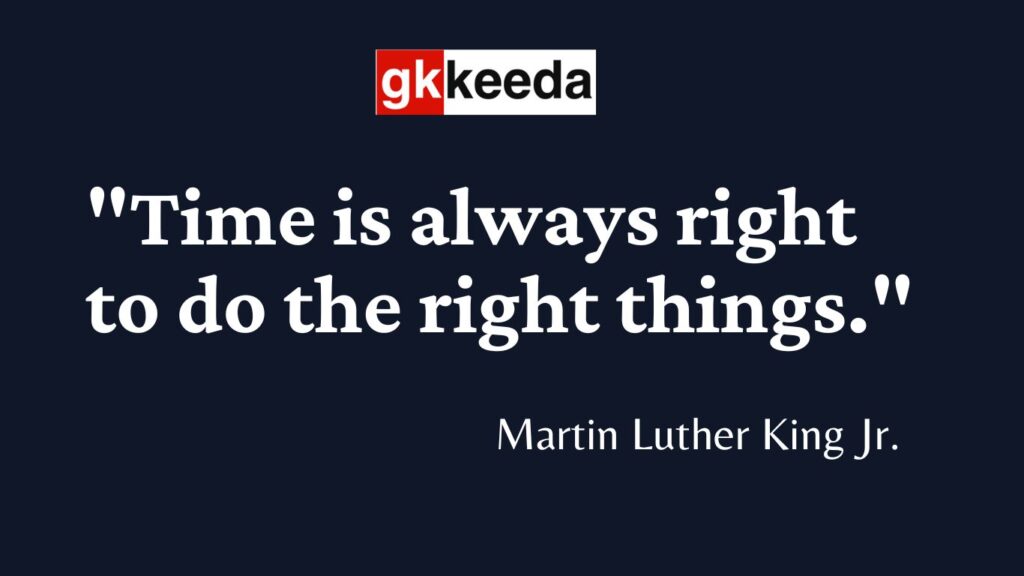Time is always right to do the right things

Introduction
It s not very uncommon to find ourselves frozen while trying to make certain decisions, the reasons may be aplenty as to why the decision-making process is stalled, it may be due to the consequences of our actions or the collateral damage associated with it or the cost-benefits calculations or the timing of our actions, but there is not one method to determine if our prospective action is going to lead to desired outcomes, however, what may aid us whilst making a decision there is never a wrong time to do the right things.
Thesis statement
In this essay, we will strive to understand how timing is crucial in doing the right things, and how it is pertinent to be decisive in doing the right things. We will outline some of the reasons that prevent good intentions from leading to good actions.
What are the right things?
The definitive meaning of the right thing may vary from context to context, such as, in a democracy expressing dissent is the right thing, in sports it is playing to the spirit of the game, for a Civil Servants it is serving the society to the best of his/her abilities, for a statesman it is to adhere to the general will of the people, at an individual capacity it may be fulfilling his/her duties in observance of custom or laws.
Why is timing so important?
If you do not time your actions right, even the best actions will go unrewarded. A noble action will always be judged on its timing and its outcomes. In fact, the timing adds value to the outcome, without the right timing even the most ennobling action can be rendered into a mere gesture.
An example of timing in the case of startups would be, a startup with a business idea that aims to get its operations up and running with some handholding from angel investors or venture capitalists. The humble beginnings of a majority of startups require external support, however, it is at this stage that the startups are most vulnerable to just fold-up, thus any help.
If the timing is right, even a small action will pave way for tangible outcomes, conversely, if the timing is wrong, the action is not going to bear desired fruits.
This stage of evolution is often considered extremely crucial for the survival and evolution of startups.
Why the hesitancy to do the right things at the right time?
There is often inertia to do the right things at the appropriate time, this can be due to fear of failure, fear of being overpowered, fear of outcomes or lack of belief in one’s own abilities, or even a lack of clarity about your purpose, etc.
Why there is never a wrong time to do the right thing?
India’s commitment to political equality aftermath of its independence from the colonial regime is often lauded by people across the world. India, despite being an infant nation with 552 princely states, 18 million refugees in the subcontinent, and an excess of 85% of the prospective voters had no experience of voting and high illiteracy. Hence many legal luminaries and constitutional experts cautioned and advised India against introducing Universal Adult Franchise, often prophesizing that it is going to be a disaster in the making.
Fast forward to the 21st century, with India on the verge of completing its diamond jubilee as an independent nation, is lauded as the “largest democracy” and a shining example of active political participation of citizens.
This decision of the Constituent Assembly to introduce Universal Adult Franchise can be put down to the fact that there is no time cast in stone as the perfect time to introduce voting for all, even when western democratic countries contemplate extending civil political rights to various to the various sections of the society without any sound logic.
Another example of doing the right thing at the right time was the decision taken by Mahatma Gandhi to withdraw the Non-Cooperation Movement aftermath of the Chauri-Chaura incident in 1922, where a mob torched a police station, though the Non-Cooperation Movement had reached its crescendo stage and was advised by some of the national leaders not to break the momentum of the struggle, Gandhiji chose to suspend the movement.
Indecision is the inability to make a decision. It stems from various factors like lack of confidence, imposter syndrome, or even decision fatigue.
In the workplace like that of a civil servant, being indecisive can have a substantial impact on people’s lives. A hypothetical scenario such as a rescue mission of a few people caught in a life-and-death situation would require a civil servant to exercise oversight and discretion to save the lives of people in tight situations, more often in a situation such as this every moment is precious with clock constantly ticking, the right thing to do is take action to save the lives of the people than worrying if he/she is the right person to take the call because he felt that people had still imbibed the ideals of non-violence and Satyagraha and the right thing to do was suspend the movement and the right time to do it was immediate.
Why the urge to do the right thing may not always be productive?
The urge to do the right things at the right time may not always lead to the right outcomes, there is also a possibility that in a bid to do the right thing, hastiness creeps into the decision-making process, and the oversight aspect is ignored.
Conclusion
The art of decision-making is something human beings have largely struggled to master, it often involves a complex situation with multiple factors involved in arriving at a decision. However, there appears to be a near-universal guide to direct human actions that an individual need not delay a good deed in pursuit of doing it at the right time.
The formation of the League of Nations (1919) is a classical example of how an action to create a supranational body without the major powers agreeing led to its failure. The first, forerunner to the UN, was conceived by President Wilson, but the United States never joined, it was a hasty attempt to establish a global body to act as a custodian of global peace, without the major powers agreeing upon a common denominator. The League of Nations turned out to be ineffectual, its signatories promised to respect the boundaries of other nations and aid each other in case of external aggression. The terms of the agreement were blatantly ignored by Italy, German, Japan, and Greater Britain leading to the decay of the institution and driving the point home that, at times some changes need to be process-driven rather than trying to bring it in one stroke.



No Comment! Be the first one.